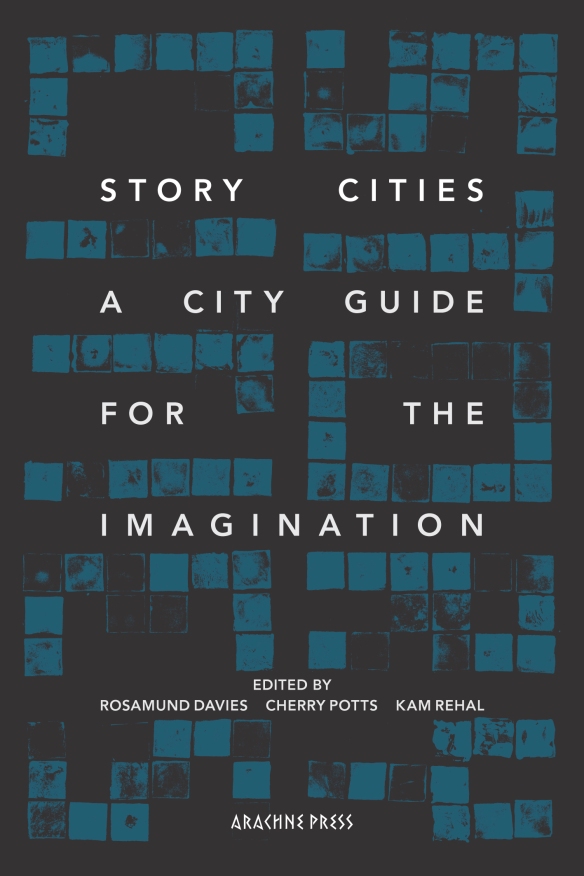Author C. A. Limina (Story Cities) interviewed by Katy Darby (Five by Five, Stations, London Lies, An Outbreak of Peace, Shortest Day Longest Night, Liberty Tales, We/She)
Katy: You have a flash fiction, Starlight, in the Story Cities anthology. Was the story inspired by the Story Cities call out? If not, what inspired you to a) write it and b) send it to Story Cities? And P.S. I love all the space(ship) imagery in it – very apt.
CAL: I wouldn’t say Starlight was inspired by Story Cities specifically, but while reading the callout I briefly flashed back to a time when I was younger. My father was renting out an apartment and needed to renovate it, so he brought me up there while he checked the progress. The arid smell of dry concrete and the night sky stayed with me for a reason I could never understand, but it was the view of the vast, spotted city lights and the hollow sky that overviewed it that stole my attention. I got two stories out of it–The Men Who Stole the Stars, the older version that got into The Jakarta Post a couple of years ago, and Starlight. Whereas the former spoke more of the bare concrete and lifeless growth that I remembered, I think I wanted Starlight to reflect more on the loneliness of the latter half of my life (I say that as if I’m sixty and about to die in a couple of months, but I think in these times, we are all spiritually tired, frail and constantly worried about death, so bear with me.) I think Starlight definitely fit more to the Story Cities call and I’ve always been glad that the editors picked it up, because I think a lot of people in the modern world have an experience or two when it comes to being awake and alone in a cold hotel, staring out into a desolate city or an unfamiliar space. Capturing that was a great deal of fun.
Katy: What’s a (free to read, online) flash fiction or short story you think everybody should read, and why?
CAL: I don’t know if it counts as flash fiction or not, but the-modern-typewriter on Tumblr makes hero vs villain pieces where they use archetypes in the place of the characters. Some of them used to be prompts but now the owner of the blog has shifted into making it their own pieces, and I think that’s great because a lot of the works are fantastic flashfics. However, a lot of them lean more to the modern styles of online fandom culture, so it’s still a matter of taste. I’ll link one of their classics here:
https://the-modern-typewriter.tumblr.com/post/159015287478/shh-its-alright-the-villain-said-youre
Katy: Tell me about the first piece of fiction you ever had published.
CAL: Oh boy. Informally plenty of my work has floated across the web in various forums, so I’d be hard pressed to say which of them were my first. Formally one of the first places that I’ve ever had the pleasure of being featured in was the Jakarta Post, from the same story I mentioned in earlier. That was published in December of 2018, but it’s been in my rework pile for what must be years, so I’m glad it finally got out of the old trunk. Other than that, I don’t think I have much else to say about it. The Men Who Stole the Stars was a byproduct of didactic phase in my portfolio, and it shows–lots of commentary on the hollowness of urban culture, some poetry and nice words to back it up, but not nearly as profound as my younger self thought it was. It’ll always hold a special place in my heart regardless, but one day I hope I’ll be in a position where I can look at it and wholeheartedly think “God, what was I thinking?”
Katy: Tell me about your favourite story of your own which hasn’t found a home yet?
CAL: Tough question! Some of my lecturers have compared writing a piece to having a baby, but if how I treat my writing is any bit analogous to how I may treat children, I should be forbidden to sire an offspring. In any case, I have a debilitating dislike for most of my “children,” not necessarily because of a lack of quality but more because I find too much of myself in them. I think, if I had any “favorite child,” it would have to be the journal entries of a robotics technician who works to repair/study the malfunctioning AI of an android modelled after her late abusive father that develops behaviors its inspiration never possessed. It’s probably never going to leave the trunk by virtue of my never having written sci-fi and barely ever reading the genre as well, but it’s a good feels trip to write regardless, and it made me happy so that’s all that matters.
Katy: What’s your favourite story by someone else in Story Cities? Why?
CAL: Coffee by Shamini Sriskandarajah. I interviewed the author a couple of weeks back and she was extremely nice, a very pleasant person all around. I’m just awed by its atmosphere, really, the tension summed in such few words. I think it exemplifies everything a good flashfic should be, a story plucked from the city–well, in Coffee‘s case, plucked from the terminus, but the end result is the same.
Katy: What story are you working on (or thinking about) right now?
CAL: I have an extremely early draft of a WIP written in pencil. Professionally, it’s a look into the life of a skilled interpreter who is hired to introduce an otherworldly tourist to the human world, learning the language of nature in the process. Unprofessionally, it’s a story of a polylinguist who has the hots for the sea.
Katy: What’s one DO piece of advice you’d give to someone who writes or wants to?
CAL: See the next question.
Katy: And what’s a DON’T?
CAL: Don’t listen to me, or anyone else when it comes to writing. That’s kind of paradoxical, but what I mean is automatically following advice when it comes to writing is like following advice on how to live a good life–very little of it pans out in the end because of sheer subjectivity, and advice that pans out for everyone end up being so common they might as well be truisms, like “show don’t tell.” I’m not saying everyone who’s ever given writing advice is wrong, not at all, but I am saying that the first thing you should probably do is figure out what you want to do with yourself. Do you want to entertain others? Do you want to express yourself? Every piece you write should have purpose, even if it’s as trifle as “I just wanted to have fun,” and once you discover that purpose, then you can begin to sift through the endless scroll of thought-pieces to understand how to achieve that purpose. Even then, my instructions might be making you red in the ears, which is entirely valid. The way I see it, there are only two things that truly matter in writing, and that’s how a) you feel about it and b) your audience will feel about it.
Well, I’ve already somewhat given a Do advice in my contradictory Don’t advice, so I might as well give one more. Read and listen. It’s truistic advice, but I know more than a handful of people who write more than they read (including me nowadays, oops), and that usually results in their repeating certain cliches within their mediums or making “amateur” mistakes or breaking vital conventions. The purpose of reading and listening is not to be instructed by others, but to find your own set of instructions, to understand what you like, dislike, want to see more of and want to see less of. This is how you know when certain advice is worthy enough to be listened to and when others aren’t going to fit your flow.
Katy: What are the best and worst things about lockdown for you, as a person or a writer?
CAL: Best thing is I get to be alone with my thoughts. Worst thing is I get to be alone with my thoughts.
Katy: We all contain multitudes, and I notice that you have several names (Eli, Cal, C.A.) – do you use them for different purposes (e.g. a gender neutral writing name) or do they all feel like you/represent some different aspect of yourself?
CAL: I’m pretty non-conforming when it comes to gender, especially in my home country, so neutrality always felt more fitting than anything else. Some of my names, like Eli, are a byproduct of when I was in high school and still figuring myself out. My email account has been around for a while and I never got to changing its title because I never wholly disagreed with the identity my high school self formed. Cal is my name in the present, and a syllabic version of my initials (C.A.L), and I was lucky enough to be in a supportive environment with companions who’d refer to me as that. I only started formally publishing works in my freshman year, so I never figured out a good pen name, but I did start to favour the Indonesian heritage associated with my last name, Limina. The era of President Soeharto forced Chinese Indonesians like my father to change their original names and do various other things in order to “assimilate” into the “culture,” erasing huge chunks of the secondary identity most Chinese Indonesians in Java had. I imagine the same thing is happening to a lot of cultures from developing nations in a globalist world, and something similar occurs to queer folks who are alienated by their “traditional” cultures. The core of it all is the birth of a new identity from the loss or rejection of an old one. I enjoy the metaphor my last name serves me, the idea that I was not born, but moulded by circumstance, the notion that I both did and did not choose who I became. It has no intrinsic meaning beyond that, though, so perhaps one day I’ll go by something else.
You can buy all the Arachne books mentioned from our webshop, we will post them out to you.
If you would prefer eBooks, all these books are available from your usual retailer. we recommend Hive for ePub.
Like this:
Like Loading...












